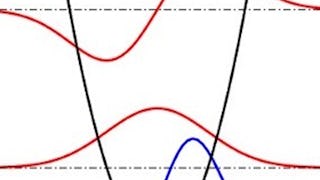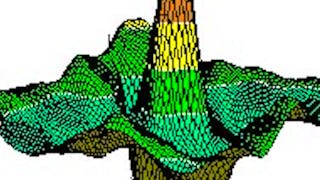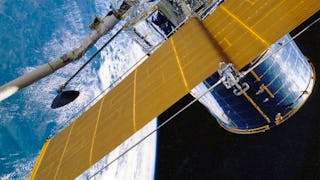Course 2 of Statistical Thermodynamics presents an introduction to quantum mechanics at a level appropriate for those with mechanical or aerospace engineering backgrounds. Using a postulatory approach that describes the steps to follow, the Schrodinger wave equation is derived and simple solutions obtained that illustrate atomic and molecular structural behavior. More realistic behavior is also explored along with modern quantum chemistry numerical solution methods for solving the wave equation.



Quantum Mechanics
This course is part of Statistical Thermodynamics Specialization

Instructor: John W. Daily
23,697 already enrolled
Included with 
(724 reviews)
What you'll learn
Describe the relationship between the Schrödinger wave equation and atomic/molecular structural behavior
Demonstrate an understanding of modern quantum chemistry numerical solution methods for solving the wave equation
Analyze the role of quantum mechanics in explaining atomic and molecular structural behavior
Skills you'll gain
Details to know

Add to your LinkedIn profile
1 assignment
See how employees at top companies are mastering in-demand skills

Build your subject-matter expertise
- Learn new concepts from industry experts
- Gain a foundational understanding of a subject or tool
- Develop job-relevant skills with hands-on projects
- Earn a shareable career certificate

There are 3 modules in this course
Module 1presents an introduction to quantum mechanics at a level appropriate for those with mechanical or aerospace engineering backgrounds. Using a postulatory approach that describes the steps to follow, the Schrodinger wave equation is derived and it is showen that the time dependence can be separated and a stationary wave equation results.
What's included
4 videos4 readings1 assignment1 discussion prompt
In module 2 we solve the stationary wave equation for several simple systems. These include the particle in a box, the rigid rotator, the harmonic oscillator, and the hydrogenic atom. These simple solutions form the basisi for discussing real atomic and molecular behavior in the next module.
What's included
4 videos4 readings1 discussion prompt
In Module 3 we explore the more realistic behavior of atoms and molecules. We also introduce and discuss numerical methods for solving the wave equation.
What's included
6 videos6 readings2 discussion prompts
Earn a career certificate
Add this credential to your LinkedIn profile, resume, or CV. Share it on social media and in your performance review.
Instructor

Offered by
Explore more from Mechanical Engineering


University of Maryland, College Park
 Status: Free Trial
Status: Free Trial
University of Colorado Boulder
 Status: Free Trial
Status: Free Trial
University of Colorado Boulder
 Status: Free Trial
Status: Free Trial
University of Colorado Boulder
Why people choose Coursera for their career




Learner reviews
724 reviews
- 5 stars
69.61%
- 4 stars
20.99%
- 3 stars
4.97%
- 2 stars
1.24%
- 1 star
3.17%
Showing 3 of 724
Reviewed on Jul 23, 2020
Best instructor and wonderful teaching style and I love quantum.
Reviewed on Sep 19, 2020
it's nice organised and guided us through, it could be clearer in some illustration and explanation.
Reviewed on May 24, 2020
This Course on Quantum Mechanics is well organized and easy to understand. Course has been excellently delivered by Instructor. I recommend this course to physicist.

Open new doors with Coursera Plus
Unlimited access to 10,000+ world-class courses, hands-on projects, and job-ready certificate programs - all included in your subscription
Advance your career with an online degree
Earn a degree from world-class universities - 100% online
Join over 3,400 global companies that choose Coursera for Business
Upskill your employees to excel in the digital economy
Frequently asked questions
Access to lectures and assignments depends on your type of enrollment. If you take a course in audit mode, you will be able to see most course materials for free. To access graded assignments and to earn a Certificate, you will need to purchase the Certificate experience, during or after your audit. If you don't see the audit option:
The course may not offer an audit option. You can try a Free Trial instead, or apply for Financial Aid.
The course may offer 'Full Course, No Certificate' instead. This option lets you see all course materials, submit required assessments, and get a final grade. This also means that you will not be able to purchase a Certificate experience.
When you enroll in the course, you get access to all of the courses in the Specialization, and you earn a certificate when you complete the work. Your electronic Certificate will be added to your Accomplishments page - from there, you can print your Certificate or add it to your LinkedIn profile. If you only want to read and view the course content, you can audit the course for free.
If you subscribed, you get a 7-day free trial during which you can cancel at no penalty. After that, we don’t give refunds, but you can cancel your subscription at any time. See our full refund policy.
More questions
Financial aid available,

